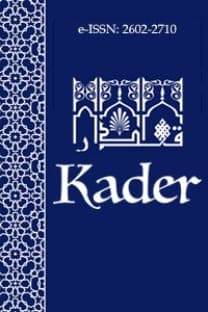Müslümanlar Neden Teröre Alet Oluyorlar?
Muslims, Religious Terror, Globalism
Why Muslims Become Instruments of Terror?
___
- Abdülvahhab, Muhammed (1414). Kitâbü’t-Tevhîd. Medine: Merkezi Şuuni’d- da’ve.Ataöv, Türkkaya (2003). Terörün Arkasında Kim Var? NPQ Türkiye, Cilt 5, Özel Sayı, 7-18.Ataöv, Türkkaya (2004). 11 Eylül: Terörle Savaş mı Bahane mi?, İstanbul: Alkım Yayınevi.Biçer, Ramazan (2002), Türk Düşünce Tarihinde Selçuklular Devrinin Yeri ve Önemi. Türkler. (ed. H. C. Güzel, K. Çiçek, S. Koca), İstanbul: Yeni Türkiye Yayınları.Biçer, Ramazan (2006) Religious Understanding of Turkish and Pakistani Peo- ple. Ethics, Values and Society: Social Transformation. (ed. Ghazala Irfan). Oxford: Oxford University Press, 273-283.Biçer, Ramazan-Dalkılıç, Mehmet (2010). Dini Temalı Terör Hareketlerinin Ana Nedenleri. Terörün Sosyal Psikolojisi, Ankara: Polis Akademisi Yayınları, 91-120.Chomsky, Noam (1999). Uluslararası Terörizm: Görüngü ve Gerçek. Terör Ne Terörist Kim. (trc. Metin Duman). Ankara: Ütopya Yayınevi.Chomsky, Noam (2002). 11 Eylül ve Sonrası: Dünya Nereye Gidiyor? (trc. T. D., N. E., M. K., A. K). İstanbul: Aram Yayıncılık.Duralı, Teoman (2003). Ezilenin Gayr-i Meşru Silahı: Terör. NPQ Türkiye, Cilt 5, Özel Sayı, 19-26.Esposito, John L. (2002). Kutsal Olmayan Savaş (trc.N. Yılmaz-E. Yılmaz).İbn Teymiyye, Ebü’l-Abbas (t.y). el-Fetâva’l-Kübrâ. Beyrut: Darü’l-Ma’rife. Kazvinî, Zekeriya (t.y.). Asârü’l-Bilâd. Beyrut.Manisalı, Erol (2003). .Küresel Düzen ve Küresel Terör. NPQ Türkiye, Cilt 5, Özel Sayı, 41-43.Örgün, Faruk (2001). Küresel Terör. İstanbul: Okumuş Adam Yayınları.Özel, Mustafa (2003). Yeni İkiz Kuleler: Küresel Terör, Küresel İmparatorluk. NPQ Türkiye, Cilt 5, Özel Sayı, 47-50.Roux, Jean-Paul (1994). Türklerin ve Moğolların Eski Dini. İstanbul: İşaret Yayınları.Sezgin, Osman-Biçer, Ramazan (2006). Foundation of Tolerance in Turkish Culture. The European Legacy. London: Routledge, XI, 405–415.Turan, Sara Gül (1996). Türkiye’de Din Terörü. İzmir: Arda’s Yayınları. Yılmaz, Rasih (2004). Büyük Tramva: Küresel Terör Türkiye’de. İstanbul: Karakutu Yayınları
- Yayın Aralığı: 2
- Başlangıç: 2003
- Yayıncı: Mehmet BULĞEN
Mu‘tezile’nin Basra Ekolüne Göre Tab’ Teorisi ve Bu Teorinin Bazı Kelâmî Konulara Uygulanması
ATOMCU-DUALİST-TESLİS ANLAYIŞINA KARŞI MU’TEZİLE’NİN MEYDAN OKUMASI: YENİ BİR TANRI-ÂLEM TASAVVURU
İngiliz Erken Dönem Şiîlik Çalışmaları ve Thomas Herbert Örneği
Kelâmî Görüşleri Bağlamında İbâzîlerin Hâricîliği Meselesi
MÂTÜRÎDÎ’DE İSTİDLÂLİN İŞLEV ALANLARI
Dünden Bugüne Nedensellik: Gazzâlî ve Kuantum Teorisi
Ahmet Mekin KANDEMİR, Karen HARDİNG
İNGİLİZ ERKEN DÖNEM ŞİÎLİK ÇALIŞMALARI VE THOMAS HERBERT ÖRNEĞİ
FANATİZM OLGUSU VE DİNÎ KÜLT YAPILARDA ELEŞTİRİSİZLİĞİN ELEŞTİRİSİ
